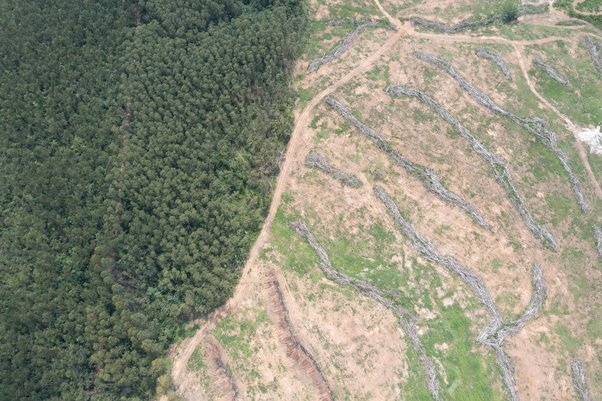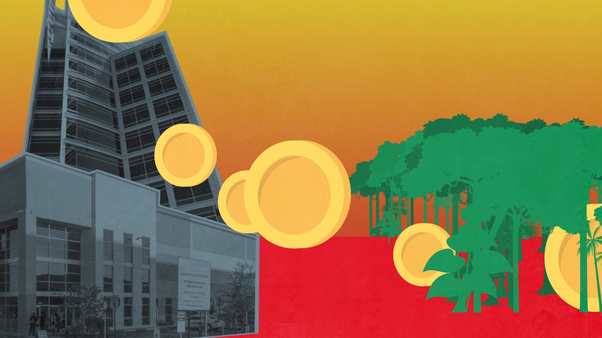The EU’s anti-deforestation law must not be weakened or delayed again – it needs to enter into force at the end of 2025 to protect forests and those who defend them
The EU’s flagship law to save forests is set to come into effect at the end of 2025 – and new data from Global Witness shows just how much of a difference it will make.
If introduced on time, the law will require companies to prove their products aren’t linked to deforestation and human rights abuses, helping to save more than 8 million hectares of forest over the next decade – an area approximately the size of Austria, according to our new analysis.
That’s the same area size as all the forests in Belgium, Croatia, Cyprus, Denmark, Ireland, Luxembourg, Malta, the Netherlands, Slovakia and Slovenia combined.
The analysis is based on projected deforestation rates and past trade patterns between the EU and countries that produce high-risk commodities like soy, beef and palm oil.
What’s more, ours is a very conservative calculation of how much of the world’s forest ecosystems will be saved. When we ran a separate analysis using an increased estimated global deforestation rate, we found that the amount of forest loss the EUDR will prevent may be more than 50% higher.
The EUDR will also help prevent forest degradation, damage that isn’t captured in our analysis. Forest degradation is when a forest or some of it remains standing but loses its health and ability to support wildlife, regulate the climate, and provide for people due to damage from threats like logging or climate change.
That means the actual amount of forest the EUDR could help protect in its first 10 years is likely far greater than current estimates suggest.
Protecting forests is a key pillar of climate justice
By capturing and storing carbon dioxide, forests are vital to the fight to stop climate breakdown and biodiversity loss. Preserving 8 million hectares of forests would have a huge impact on global climate goals, with our data suggesting it would prevent 2.169 billion tonnes of net CO2 emissions.
To put this figure into context, this is equivalent to the annual aviation emissions between July 2023 and July 2024 at the EU’s busiest airport, Paris Charles de Gaulle, 195 times over.
The forests we depend on to fight the climate crisis today are still here because of brave land and environmental defenders. Environmental defenders have stood in the way of their destruction. From resisting land grabs to exposing illegal logging, defenders have too often paid the ultimate price for protecting our planet.
How will the EUDR save forests?
The EUDR will make a major difference by requiring companies to prove that products commonly linked to deforestation – like cocoa, beef and soy – haven’t been produced on recently deforested land. To do this, they’ll need to trace each product back to the exact plot of land where it was produced.
Right now, there’s no reliable way for consumers to know whether the goods they buy are linked to deforestation – not because it’s impossible to trace supply chains, but because too many companies are failing to do it. The result is that genuinely deforestation-free products are still hard to source at scale.
Under the new law, companies will now have to make sure that no other illegalities, such as corruption or land rights’ violations, occurred in production. If they have, then the product won’t be allowed onto the EU market.
Products covered by the law include coffee, timber, palm oil, cattle, soy, rubber and cocoa, as well as their derived products such as chocolate, beef and leather.
Law under threat despite huge support
The EUDR has recently faced criticism from some politicians in Europe, including the powerful European People’s Party bloc. Last year, they spearheaded efforts to delay the law by 12 months in spite of most lawmakers from the same party helping to pass it in 2022. This u-turn followed intense lobbying from corporate interests.
As well as being hugely beneficial for the planet, it also has popular support. A petition supporting the law was backed by 1.2 million citizens from across Europe, and hundreds of organisations from around the world – including many in countries that produce deforestation-risk commodities – called on the EU to uphold it.
Polling conducted by Savanta in late 2024 across seven EU countries found widespread public support for the EUDR, with 84% of respondents in favour of its implementation and 73% saying it should be an EU priority.
In November 2024, more than 50 companies publicly reaffirmed their commitment to the European Green Deal, including the EUDR, emphasising that strong, stable environmental regulations are essential for long-term business competitiveness and warning that deregulation would undermine the legal certainty needed for sustainable investment.
What’s next?
If implemented on time, the law will come into effect on 30 December 2025 for large businesses, after which national customs agencies can begin conducting anti-deforestation checks on goods entering the EU market. With landmark protections on the line, the law is set to be a ray of hope in the struggle against climate breakdown.
Methodology: EUDR data analysis
Download Resource

